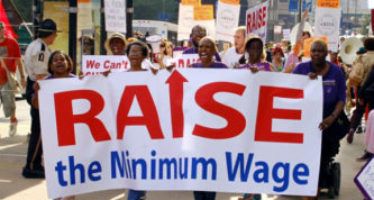Governor adopts budget realism
MAY 14, 2010
By JOHN SEILER
The party’s over.
That’s the message from Gov. Arnold Schwarzenegger’s austere May Revise, released today, of his budget for fiscal 2010-11, which begins on July 1. It calls for cutting $3 billion from state spending over the previous year, dropping it down to $83.4 billion for the general fund. The estimated $19 billion deficit would be eliminated and a $1.2 billion reserve would be available. There would be no new taxes.
The deficit reduction number actually is close to realistic, Rep. Tom McClintock, R-Rocklin, told me; for more than 20 years in the state Legislature he was California’s fiscal watchdog, before being elected to the U.S. Congress in 2008. He said that while the governor’s numbers are a proposal, the actual numbers coming in at the state Controller’s office show a deficit for the past 12 months of only $500 million.
As ex-Gov. Gray Davis once said about one of his own budgets, that’s “close enough for government work.”
In Schwarzenegger’s May Revise, major programs would be slashed or eliminated, saving:
- $1 billion by ending CalWORKS, a welfare-to-work program.
- $1.2 billion by ending daycare funded by state taxpayers.
- $673 million by cutting in-home healthcare for the elderly by a third.
It will be difficult to get these cuts through the Democrat-controlled Legislature, whom the governor blamed for not acting earlier on proposals he made to save money.
As to whether the governor will get the cuts, McClintock said, “I doubt it. That requires a political battle the governor isn’t willing to fight. It’s the equivalent of Schwarzenegger throwing up his hands and saying to the Legislature, ‘You guys fix it. I’m not going to be serious this year. I’m going to Colorado’,” a popular Schwarzenegger
McClintock said that CalWORKS and the other programs certainly need serious reforms to eliminate fraud. For example, he said, “You should send an investigator the the person’s home to see if they really need the program and are actively seeking work.”
The budget proposal says it “continues to fully fund K‑12 education, increases funding for the University of California, the California State University, and the California Community Colleges to avoid further tuition increases or deep cuts to the classroom.”
McClintock said that the problem there, and with prisons, is that the state bureaucracy still carries too much overhead. More power over schools and prisons has to be devolved back to principals and wardens so they can adapt programs and spending to particular situations, instead of imposing costly state mandates.
The budget also expects to get $3.4 billion more from the federal government to pay for such things as housing illegal immigrants, about half what the governor asked for in January. “Not if I have anything to say about it,” McClintock said. His position, in which he has been joined by Democratic U.S. Sen. Dianne Feinstein, has been that California’s government caused the state’s deficit by overspending and the rest of the country’s taxpayers shouldn’t be forced to fund a bailout.
But he conceded that he’s a Republican in a Congress with heavy Democratic majorities in both houses, so some sort of bailout is likely. House Speaker Nancy Pelosi, a Democrat, hails from San Francisco. At least, McClintock said, the governor’s request “is more realistic than what he had before.”
Much of the May Revise’s accuracy depends on what happens with the national and state economies over the next year.
It says, for the nation, “Ongoing robust job growth will be needed to keep the recovery moving ahead…. According to the current outlook, the unemployment rate will improve gradually and may not reach “full employment” for several years.”
The Revise points out something I have noted here on CalWatchDog.com, that California unemployment has been jumping much higher than the national level in recent months: “California’s unemployment rate partially bucked the national trend by climbing through the early months of 2010. The national rate leveled off at 10 percent in November and December 2009 and slipped slightly during the first quarter of 2010. The state’s rate, in contrast, was still trending up through March 2010, reaching 12.6 percent.”
It doesn’t explain why this has happened, which I have blamed on Schwarzenegger’s February 2009 tax increases and the impending imposition of AB32, the draconian global warming legislation that will begin hitting the state next January – unless an initiative in November effectively repeals it.
But it expects that “The longest and deepest recession in the post‑Depression era is most likely over,” yet is cautious: “The recovery, will probably be moderate and prolonged by historical standards. This means that the outlook for the near future is positive but sober.”
However, the May Revise takes no notice of the ongoing meltdown of the Greek government and economy, the potential crash of the Euro and the European economies and the effects all of that would have on America.
McClintock noted that a positive aspect is that next year Gov. Schwarzenegger’s 2009 tax increases expire, a positive for the state economy. But next year many of President Bush’s tax cuts expire, meaning a major negative for the overall U.S. economy. How the mix of tax cuts/tax increases affects California state revenues cannot be known.
Another major economic uncertainty is the possible repeal, mentioned earlier, of AB32. Its repeal could be a boon to the state’s economy, while its defeat could mean, according to some studies, the loss of many jobs.
It’s worth mentioning that AB32’s backers, who oppose its repeal, say the opposite: that it will create jobs. If AB32 is repealed, some companies that have started to take advantage of its rules might no longer be viable. In any case, the whole matter and its affect on the economy is up in the air until November.
McClintock said that, in the 1960s and early 1970s, California commonly was one of the last states to go into recession and one of the first to come out. Now, it’s the opposite: we get clobbered first and come out last. “There’s just so much additional baggage now, including higher taxes and regulations,” he warned. “We’ll be the first to drop in any new recession.”
John Seiler, an editorial writer with The Orange County Register for 19 years, is a reporter and analyst for CalWatchDog.com. His email: [email protected].
Related Articles
Anti-vax referendum push falls short
The drive to restore California’s vaccination exemptions through the state referendum process has failed. At stake was Senate Bill 277, signed into law
New DMV rules would allow testing of driverless vehicles without human in car
Responding to industry criticism and public uncertainty, California has rejiggered its rules to accommodate fully driverless vehicles. “California’s new proposals
Minimum wage divides experts
Voters will likely decide on the November ballot whether or not to raise California’s minimum wage to $15 per hour,




